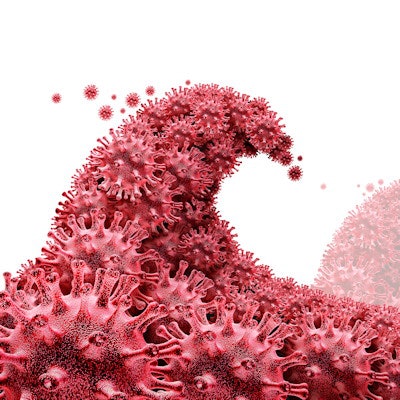
The COVID-19 pandemic led to apparent decreases in cancer incidence for several cancer types, suggest Canadian findings published September 5 in JAMA Network Open.
Researchers led by Kathleen Decker, PhD, from Paul Albrechtsen Research Institute CancerCare Manitoba in Winnipeg found that breast and head and neck cancers decreased by nearly 50% during the early days of the pandemic in North America. Lung cancer rates remained stable until decreasing in December 2020.
"All other cancer sites demonstrated minimal long-term changes in incidence," Decker and co-authors wrote. "However, the cumulative deficit for some high-fatality cancers is concerning and needs attention from health care delivery organizations."
One of the main concerns among radiologists about the COVID-19 pandemic is potentially missed cancer diagnoses during the time screening decreased in response to the need for social distancing and reallocating medical resources.
The researchers pointed out that the importance of assessing ties between the pandemic and cancer incidence is multifactorial, including addressing public and patient anxiety; informing recovery efforts; and identifying strategies to better prepare for future healthcare disruptions.
Decker and colleagues explored potential links between the pandemic and cancer incidence in Manitoba, Canada, using data from the Manitoba Cancer Registry. The team included data from 48,378 people diagnosed with cancer between 2015 and 2021, considering the following cancers: breast, lung, prostate, colon, rectal, hematologic, urinary, unknown primary site, head and neck, brain and central nervous system, gynecologic, other digestive, melanoma, pancreatic, and endocrine.
The researchers found that in April 2020, there was a 23% decrease in overall cancer incidence. Breast and head and neck cancers decreased by 46% and 50% respectively during this time, while lung cancer incidence remained stable during the spring and summer months of that year but dipped by 11% in December 2020.
The investigators also found cancer incidence decreases ranging from 33% to 65% for colon, rectal, melanoma, and endocrine cancer diagnoses. However, hematological cancer and cancers with an unknown primary site increased by 12% and 8%, respectively. Also, diagnoses related to brain and central nervous system, as well as urinary cancers decreased consistently between April 2020 and December 2021 by 26% and 12%, respectively.
As of December 2021, Manitoba had an overall estimated deficit of 692 (5.3%) cancers. Breast, colon, and lung cancers saw the largest such deficits at 14.1%, 12.2%, and 7.6%, respectively, the team reported.
Breast cancer incidence decreased by 20% among women ages 75 and older, which the authors suggested may be tied to reductions in diagnostic mammography availability, hesitance in seeking medical care during the pandemic, or the impact of COVID-19 on mortality among older adults. Regarding the drop in lung cancer incidence in December 2020 among adults ages 75 and older, the team suggested that the trend could be due to the increased rate of COVID-19 infections in Manitoba in the second and third waves of the pandemic.
The authors called for observational studies to explore potential associations between the COVID-19 pandemic and decreases in cancer incidence in other geographic regions.
The full study can be found here.




















